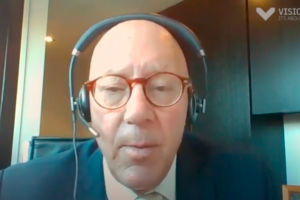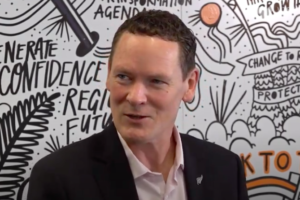10th June 2020 By Shannon Williams | shannon@tourismticker.com | @tourismticker
The collapse of tourism has been like “turning the ignition key off” for Queenstown, says the resort’s mayor, Jim Boult.
Speaking at the virtual VisionWeek event this week, which asks the question, “What next for New Zealand?”, Boult said districts such as Queenstown Lakes would continue to be affected by the impact of the pandemic.

Jim Boult
“We find ourselves now as a country that had as its largest foreign exchange earner, tourism, really in quite a lot of trouble,” he said.
“All industries are affected by this in some fashion, but if you take tourism, and particularly the Queenstown Lakes District, for most of New Zealand tourism is important, but for our part of the world, it’s simply was our economy. And it’s rather like turning the ignition key off – that’s it, there is no income, there is no reduction, it is a cessation of income.
“We can survive, but we’re certainly not going to thrive. Domestic tourism is never as lucrative as the international market.”
Boult said an encouraging aspect was that 36% of visitors to Queenstown and Wanaka were Kiwis.
“We know they like coming here, we just need to them to come back here in numbers.
“If we can get the trans-Tasman bubble operating, we know Australians love coming to Queenstown and Wanaka, so we think we can do okay if we can get there. It will be tough, but we can survive.”
Speaking at the same event, Tourism New Zealand chief executive Stephen England-Hall said there was an opportunity for places like Queenstown, as well as all of New Zealand, to do things differently.

Stephen England-Hall
“Prior to Covid-19, there was this rising concern about the volume of tourism in certain locations, particularly hotspots like Queenstown, and Rotorua to a lesser extent,” he said.
“They were feeling pressure, local communities were certainly feeling pressure. That is definitely a lack of infrastructure investment, not necessarily an oversupply of tourists.
“So for somewhere like Queenstown, how does it redesign itself coming out of Covid, to say, could we set ourselves up differently, could we have a better model for engaging with communities, could we have a better design footprint for infrastructure services that better meets the need of our community but also helps service our international or domestic visitor?”
England-Hall said the pandemic had created “a great opportunity to rethink our infrastructure design”.
“It’s a great opportunity to bring in the voice of iwi, the voice of community, as well as the voice of the industry to make sure we’re designed for the future in a way that overcomes some of those challenges we were starting to see in the past, because at the end of the day it’s not just about the visitor it’s also about us.
“This is our home. This is where we live. And we want to make sure that when we open our country up for others to come and join and visit that we benefit too.”
New Zealand’s tourism industry was “scalable” and “very flexible”.
“And although there will be job losses and there will be businesses fail, there will be some that don’t, and there’ll be new jobs created and there’ll be new businesses that will emerge from it,” England-Hall said.
“So I think this is a reset for the sector rather than a complete, you know, disintegration.”
5 Apr 2024 Harvest Hawke’s Bay confirms 2024 event
29 Jul 2022 Carnival president joins Cruise360 Australasia
14 Jul 2022 Light fest returns…
13 Oct 2021 Flight Centre’s Illuminate on track
27 Sep 2021 Wānaka to host regenerative tourism hui
13 Sep 2021 New festival for Lake Karapiro in October